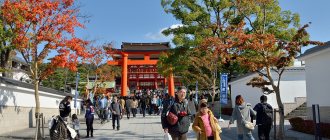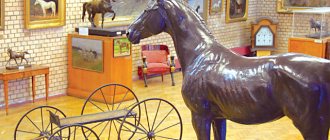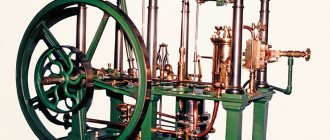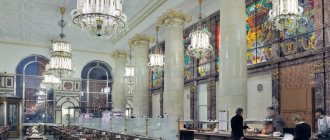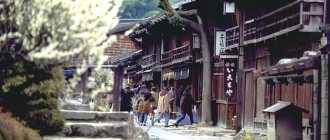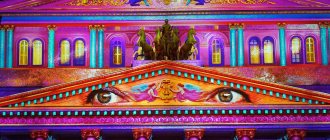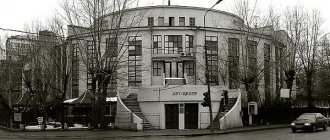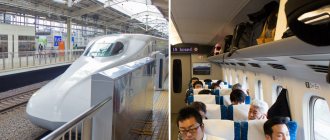Mount Tsukuba
Mount Tsukuba (tsukuba-san, 筑波山) is located in Ibaraki Prefecture, almost in the center of the Kanto Plain, which offers magnificent views from its peaks.
The mountain has two peaks - Nyotai-san (女体山) (877 m high, female peak) and Nantai-san (男体山) (871 m high, male peak), on which temples are located female deity - "Izanami-nomikoto" and male deity - "Izanagi-nomikoto".
According to mythology from Nihon Shoki (日本書紀), thousands of years ago a deity descended from the heavens and asked two mountains for a place to stay for the night. Mount Fuji, with its ideal cone-shaped peak, reasoning with pride and arrogance, decided that it did not need the blessing of a deity, and refused. Mount Tsukuba, on the other side of the Kanto Plain, humbly greeted the dear guest and even offered him food and water. Today, Mount Fuji is cold, lonely and barren, while Mount Tsukuba is filled with a variety of vegetation and colors.
Also, ancient scriptures say that the sacred ancestors of the Japanese race, the male deity Izanagi-nomikoto and the female deity Izanami-nomikoto, are kept here. Legends claim that here two deities got married and gave birth to other deities.
Guide in Tokyo
This excursion is ideal for you if you are looking for an exclusive, real Japan without the hackneyed tourist spots. After all, you will have the opportunity to see the real life of a small town, and if you’re lucky, even meet and communicate with the local population, which is quite friendly outside of large conglomerates. You can also visit quite remarkable places with beautiful rural landscapes.
This excursion is special. I do not offer a ready-made program, but a list of places from which you can choose any 3-4 according to your taste and interest. Travel options include: car, taxi, city buses and even a bicycle! Each of them has its undeniable advantages, so choose what is closer to you and what fits best into your budget. In this regard, the cost of the excursion is indicative, since it can greatly depend on the content and transport.
And so, this is what I suggest you visit or try.
1) The tallest Buddha statue is Usiku (height with pedestal - 120 meters). This is one of the tallest Buddha statues in the world and the tallest in Japan. In fact, this is a temple that anyone can get inside. In addition, the statue is located in a beautiful park, in which something blooms almost all year round. On the territory there is a pond with absolutely unforgettable, eternally hungry carp with huge gulps. This leaves no one indifferent. And children will be able to enjoy the small zoo, which is located here. You can take a walk in it (feed and pet) fluffy rabbits, or try to catch a squirrel.
2) One of the most famous in Japan is the picturesque Mount Tsukuba with two peaks - Male (871 meters) and Female (877 meters). The Japanese sometimes equate it with Fuji, saying “Fuji is in the west, Tsukuba is in the east.” It is believed that gods live on the mountain and patronize married life, so many people come to worship at local temples in search of a happy family life: young people hope to find help in finding their soul mate and starting a family; already married - with their hopes for improving family relationships or everyday life. On the mountain there is a beautiful garden with plums (bloom in February-March) and hydrangeas (bloom in June-July). This mountain is also known for its healing toad oil, which easily heals any wounds.
3) Exclusive tasting of Japanese tea in a small family tea shop, whose history goes back more than 100 years. To be honest, to organize this tasting, I had to use personal acquaintances. You will have a unique opportunity to get acquainted with the types of Japanese tea, learn its history, production features and understand the taste. Please note, this is all real high-quality tea! And after the tasting, a short walk through the countryside near the store. You can admire the beautiful ornamental gardens of local peasants and breathe the fresh air of the flooded rice fields.
4) Inspection of the “Park of Houses”, where several dozen model buildings of private houses for modern Japanese are presented. The park is intended primarily for selling housing to the Japanese, but no one will stop you and me from getting acquainted with modern trends in organizing the living space of ordinary residents of the country.
5) For children or young people, it will be interesting to visit the cat-owl-rabbit cafe, where you can chat with a cute representative of the animal world. They are at the peak of popularity now!
6) How about walking in a real kimono? At your request, a real professional, a practicing sensei, the most master of his craft, will put it on you. If suddenly the sensei is busy, I myself can dress you in traditional clothes (I can do something ;), which, by the way, can be purchased inexpensively in the next point of the program I described.
7) A couple of great used goods stores. In one of them, if you're lucky, you can find amazing antiques at a reasonable price. I recommend paying attention to the dishes, kimonos, and wall scrolls with exquisite paintings. It will be a great souvenir and a wonderful memory of Japan.
Master class on calligraphy. Not only will you learn the basic philosophical principles of this art, but you will also create a couple of masterpieces filled with special meaning, which, when you arrive home, you can frame and hang on your living room wall. You will have a chance to surprise your guests with another of your skills: it is unlikely that anyone will guess that this beauty of a distant eastern country could have been created by you personally
And further!
*If you're visiting Japan during cherry blossom season, Tsukuba is a great opportunity to enjoy the magnificent blooms without the Tokyo or Kyoto crowds. I know a couple of great places where you can safely have a small picnic with friends or family.
** And in Tsukuba there are several nice authentic restaurants with delicious traditional cuisine for every pocket, which I will be happy to recommend to you!
Meeting point with the guide: at the turnstiles at Tsukuba Station on the Tsukuba Express line. Getting there from Tokyo is quite easy: direct express train from Akihabara Station or highway bus from Tokyo Station. I will give you detailed instructions.
How to get to Mount Tsukuba
Getting to Mount Tsukuba is not difficult. You need to take the Tsukuba Express line (TX つくばエクスプレス) in the direction of the city of the same name, Tsukuba (つくば) and get to the final station, also Tsukuba (TX つくば). After exiting the city via exit A3 or A4, take the bus that leaves from stop No. 1 in the direction of Tsutsujigaoka(つつじヶ丘). Below is a diagram of the bus terminal.
And this is the schedule according to which buses run depending on the season.
By bus you can get to two points on the mountain. From them you can climb to one of the peaks.
What is the best way to get there and how to do it cheaper
If you are going to go to Mount Tsukuba, then it is best to buy a day ticket for transport, which is called Tsukuba kippu (筑波きっぷ). Such tickets are sold at any ticket machine at all stations on the Tsukuba Express Line (TX つくばエクスプレス), except for the final station, Tsukuba (TX つくば). Below are the prices depending on the departure station.
| Station name | Price per adult | Price for child (6-12 years old) |
| ① 秋葉原 - Akihabara | 4,380円 | 2,220円 |
| ② 新御徒町 - Shin Okachimachi | 4,300円 | 2,160円 |
| ③ 浅草 - Asakusa | 4,300円 | 2,160円 |
| ④ 南千住 - Minami-Senju | 4.220円 | 2,120円 |
| ⑤ 北千住 — Kita-Senju | 4.110円 | 2,080円 |
| ⑥ 青井 - Aoi | 4,030円 | 2,040円 |
| ⑦ 六町 - Rokucho | 4,030円 | 2,040円 |
| ⑧ 八潮 - Yashio | 3,950円 | 2,000円 |
| ⑨ 三郷中央 - Misato-chuo | 3,770円 | 1,890円 |
| ⑩ 南流山 - Minami-nagareyama | 3,770円 | 1,890円 |
| ⑪ 流山セントラルパーク - Nagareyama-centralpark | 3,690円 | 1,870円 |
| ⑫ 流山おおたかの森 — Nagareyama-otakanomori | 3,610円 | 1,810円 |
| ⑬ 柏の葉キャンパス – Kashiwwanoha-campus | 3,520円 | 1,770円 |
| ⑭ 柏たなか — Kashiwa-Tanaka | 3,420円 | 1,730円 |
| ⑮ 守谷 - Moriya | 3,260円 | 1,650円 |
| ⑯ みらい平 – Miraidaira | 3,080円 | 1,550円 |
| ⑰ みどりの – Midorino | 2,950円 | 1,490円 |
| ⑱ 万博記念公園 — Bampaku-kinenkoen | 2,810円 | 1,430円 |
| ⑲ 研究学園 - Kenkyu-gakuen | 2,670円 | 1,340円 |
| ⑳ つくば — Tsukuba | — | — |
This ticket includes round-trip travel from the departure station on the TX line つくばエクスプレス, a round-trip bus ticket from Tsukuba (つくば) station, and tickets for the cable car (tram) near the Tsukubasan jinja iriguchi (筑波山) stop神社入口) and the cable car from the Tsutsujigaoka bus stop (つつじヶ丘).
A detailed map with all the information can be found in this promotional brochure, but unfortunately it is only available in Japanese.
Science City Tsukuba
After Japan decided to create a scientific center in the country in 1960, the construction of the city of Tsukuba began. An interesting fact is that scientists from the Land of the Rising Sun adopted the experience that was used in Russia during the construction of the Academy Town in Siberia.
The town turned out to be very cozy and beautiful, located just 60 kilometers from the Japanese capital. There are excellent roads and straight streets, as well as many beautiful modern buildings. In addition, Tsukuba has a large amount of greenery.
The city is designed very simply and conveniently. In the center there is a residential part and public services. There, like a lighthouse, stands an observation tower, the design of which is quite unusual. A square frame is fixed on a high rod, made of massive cubes of reinforced concrete, inside of which it is difficult to see people in the form of small dots. There is a large square around the tower and a beautiful artificial pond with colorful carp dug, and institutes and research centers are located along the perimeter of this town surrounded by greenery.
The range of space problems being studied in Tsukuba is quite extensive; new robot designs are also being developed here, the seismic resistance of various structures is being studied, genetic engineering, chemistry and physics, sociology and even plant breeding are being studied. Therefore, there are many scientific institutions in the city. Let's name some of them.
Perhaps the best place to start is with the mechanical engineering laboratory, which is one of the most significant laboratories among scientific institutions in Japan. It is here that almost everything is developed: from the utilization of new types of energy to the creation of the latest technology. For example, designs and principles are being developed that will later be used in computers of the future. This laboratory once developed such a unique product as a robotic dog, intended for people who have lost their sight. This smart car not only avoids obstacles, but also warns the blind owner about the danger.
The Agricultural Institute, which is now located in Tsukuba, is more than a hundred years old. It is equipped with the most modern technology, which, of course, includes robots and the most modern computers. However, the tasks facing scientists and the object of research are as old as our imperfect world. The institute deals with the problems of agriculture, which, despite the fact that Japan has a very favorable climate and fertile land, as well as the skillful hands of peasants, still remains the Achilles heel of the country's economy.
When to go and what to expect
In fact, you can go at any time of the year and in any weather. We went there in sunny weather in summer and spring, in cloudy and slightly rainy weather in late autumn, and also on a cold winter day. All times were interesting in their own way and different from each other.
If you go in good sunny weather, the most difficult thing will be to get through the crowd of tourists who also came to look at the wonderful views from the top and take a walk.
Along the way from one peak to another, you can sit by the trees and relax, admiring the beautiful view of the Kanto Plain. If you follow the example of the Japanese, you can eat there too. They even manage to cook soup on portable burners. In summer it is very comfortable and not hot, due to the shade from the trees.
The path is quite rocky and climbing along it is not so easy. In good weather it is quite safe, but in rainy weather the stones underfoot are slippery and the ground turns to mud. But on the other hand, in bad weather there are usually very few people. This will allow you to enjoy nature, and also feel a little in a fairy tale and solitude. Usually the mountain is in a cloud in bad weather, and this creates a special mystical atmosphere. In addition, because of this, even in winter it is not cold at the top. This is what the road looks like from the cable car to Nantai-san (男体山) - the men's peak.
There are several hotels on Mount Tsukuba, not far from the entrance to the temple. If you want to enjoy the beauty not only during the day, but also to stay overnight, then it will not be so difficult to do. There is a large hotel right next to the gate. It offers incredible views of the Kanto Plain at night. If you really want to and the weather is good, you can see the Tokyo Skytree in the distance. It is difficult to convey the beauty seen with the eyes in photography, but it is still worth showing. The view is breathtaking both during sunset and after it.
Education [edit]
Higher education [edit]
- University of Tsukuba, Tsukuba Campus
- National University Corporation Tsukuba University of Technology
- Graduate School of Advanced Studies, Tsukuba Campus
- Tsukuba Gakuin University
Primary and secondary education[edit]
Tsukuba has 29 public elementary schools and 12 public high schools operated by the city government, as well as four public high schools operated by the Ibaraki Prefectural Board of Education. The prefecture also has one combined middle/high school and one special school for the disabled. There is also one private combined middle/high school.
In addition, there is an international school, Tsukuba International School, and a Brazilian school, Instituto Educare (formerly Escola Pingo de Gente). [10]
Notable people from Tsukuba[edit]
| This section requires additional links for verification . |
- Leo Esaki, Nobel laureate [23]
- Susumu Hirasawa, progressive electronic musician, has a studio in Tsukuba [24]
- Mitsuhiro Ishida, mixed martial artist
- Yasuaki Kurata, actor
- Hideki Shirakawa, Nobel laureate [25]
- Haruka Sunada, volleyball player
- Minanogawa Tozō, sumo wrestler
- Hiroki Yamada, baseball player
